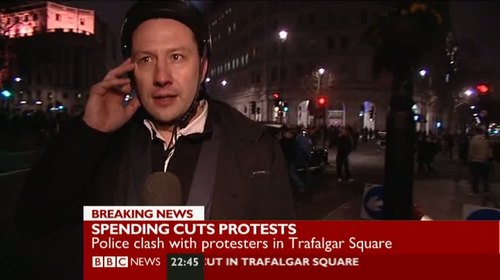In March 1984, tens of thousands of British miners went on strike over expected coal mine closures. During the next year, unions faced off with police and Margaret Thatcher’s conservative government in what became Britain’s most turbulent industrial protest of recent decades. Media coverage of the strikes was thoroughly unsympathetic, painting miners as aggressors even when police initiated clashes, according to Owen Jones, a British writer who spoke at a journalism conference Friday at the London School of Economics and Political Science.
There were no tweets or Facebook campaigns or YouTube videos to contest the narrative.
Most U.K. media coverage of protests remains unbalanced, or at worst hostile, but social media is changing the rules of the game, Jones and other panelists said at the “Reporting the World” conference, (Twitter hashtag: #polis12) organized by LSE’s Polis with the BBC Academy and the European Broadcasting Union.
A ‘closed shop’

Journalists tend to report what happened, rather than why, and highlight eye-catching or violent scenes and imply that some demonstrations are more credible than others, according to a panel of journalists and activists who discussed trends in U.K. reporting on protests.
Reporters may also ignore activism altogether — the dearth of coverage on recent protests against National Health Service reform was one example.
These biases are partly rooted in the influence of private interests on mainstream media and lack of diversity among journalists, making the press a “middle-class closed shop,” Jones said. And the gap has widened with the decline of local papers, the rise of unpaid internships, and the need for expensive qualifications, he said.

Journalists may avoid challenging corporate or government views because they take official statements at face value or fear libel charges, said Daniel Garvin, an activist from UK Uncut, an organization that has campaigned to increase coverage of tax avoidance. The problem is also demand-driven: “We want news quickly; we want it in sound bites,” he said. “It has to be spectacular.”
Based on the experience of UK Uncut, Garvin advised that activists can attract media coverage by using press-friendly language — “you can’t use words like ‘anti-capitalism’” — and devising timely hooks to fit the media’s short attention span. Visuals also help: Activist Leila Deen got plenty of air time to oppose airport expansion when she threw green custard on a government official.
Developing relationships with reporters can also get your voice heard, according to Paraic O’Brien, a reporter who represented Channel 4 News on the panel. “If I know and trust the person, I will listen,” especially if the message is clear, he said.
Tracking a moving target

Reporting on the changing face of protests, which today often lack identifiable leadership and demands, can be challenging for journalists. “If you don’t have a protagonist and you don’t have an identifiable motive, that’s a bitch of a story to tell, “ O’Brien said. “I don’t think we’ve quite got that right yet.”
In the face of tight deadlines and tighter budgets, reporters discard complex stories, said Naomi Colvin, a leader in London’s Occupy movement.
However, social media promises to change the game. “The privileged position that people creating media have is being challenged,” Colvin said. “We’re not there yet, but it is making media’s outlook much more accountable.”
News organizations would do well to embrace this shift rather than fear it, although journalists should be careful to distill the truth from staged actions, O’Brien said. “Social media changes everything,” he said. “It puts power back into the hands of the grassroots, and it means the message can be tailored from there.”
Katia Savchuk is editor of Polis, an open blog on cities and development, and a graduate student at the London School of Economics and Political Science. She previously documented the work of grassroots federations in Indian slums and worked as a private investigator. She has written for Ethical Traveler, Palo Alto Weekly, Let’s Go Travel.

